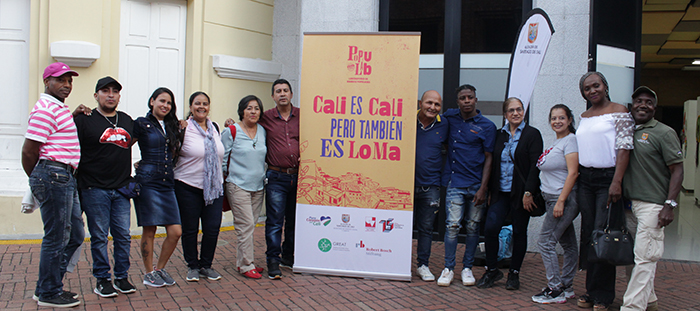The PopuLab - improving the quality of life for people in ‘popular neighbourhoods’

An initiative, which brings together people in one of Colombia’s largest cities to help improve their quality of life, and part of a Lancaster University-led project, has been officially launched.
The Laboratory of Popular Neighbourhoods (The PopuLab) is not a traditional laboratory, nor part of a building or a classroom initiative.
Rather, it is a place of thinking and practice around the meaning of citizenship which brings together people from ‘popular neighbourhoods’ (informal settlements), local authorities, and academia in Cali, the third largest city of Colombia.
Set against the backdrop of a triple crisis combining the challenges of climate change, conflict and care, the Gridding Equitable Urban Futures in Areas of Transition – known as the GREAT project - is contributing to positive change for communities in the Global South.
GREAT is funded by UKRI’s Global Challenges Research Fund.
For six decades Colombia has dealt with an internal conflict that has affected at least 8 million people largely from rural areas who have been forced to leave their homes and seek safety in cities.
The city of Cali has attracted a significant influx of internally-displaced migrants who have had their human rights violated, posing barriers to attaining a dignified life, getting access to public services and infrastructure, and securing ownership of the land where their homes have stood, in some cases, for more than 20 years.
Rather than informal settlements, or, settlements of an incomplete character (a term used by local authorities) residents from these areas prefer to call their homes ‘popular neighbourhoods’.
Cali has 192 informal settlements, according to the Mayor’s Secretariat of Social Housing and Habitat.
“The PopuLab, created by the Universidad del Valle in Cali, one of the academic partners in the GREAT project, is envisioned as a place of concrete actions seeking to improve the lives of the communities of popular neighbourhoods who, historically, have been marginalized because of their origin, status, and ethnicity,” said Dr Carlos López-Galviz, the Principal Investigator of the GREAT project and also a Senior Lecturer in Lancaster’s Institute for the Contemporary Arts.
The Populab was launched in Cali at a public event co-hosted and streamed online by the Secretariat of Social Housing and Habitat (click here for a recording of the public event).
Also linked to the launch was the presentation of the video “Intersectional Lives”, one of the first co-created products of The PopuLab (click here for the launch of the video) conceived as a methodological participatory video with and for the community of the Comuna or District 18 where the GREAT project is based.
Special guests at the launch included community members who have helped shape the development of several research and dissemination activities within the GREAT project.

Members of the community of District 18 in Cali at the launch of The PopuLab, Picture courtesy of Universidad del Valle
The Mayor of Cali’s Office is currently implementing a policy called Habitat Integral Improvement or Upgrading (Mejoramiento Integral del Habitat, MIH), which targets some of the key challenges that residents of informal settlements experience across the city (see video outlining the key principles and reach of the MIH policy, in Spanish).
Through initiatives such as The PopuLab, and with GREAT’s support, the Universidad del Valle has advocated an approach for local authorities to implement in their MIH policy which pays attention to questions such as gender, ethnic origin, socioeconomic status, and whether residents have been a victim of the armed conflict or not.
Of this successful collaboration bringing together academia, local authorities and communities from popular neighbourhoods, Dr Ángela Franco, Co-Investigator in the GREAT project, said: “The collaboration between the Secretariat of Social Housing and Habitat and the residents of Comuna 18, four popular neighbourhoods, namely, Alto Polvorines, Brisas de las Palmas, La Arboleda, and Pampas del Mirador, has resulted in the start of the legalisation process with the local government.”
Dr López-Galviz added: “The results of this pilot are likely to be replicated in other informal settlements.
“And thanks, in part, to the GREAT project, Cali has become the first city in Colombia with a housing and habitat policy using an intersectional approach, that is, a policy considering gender, ethnicity, income and the effects of Colombia’s armed conflict, to address the many and difficult challenges facing the residents of popular neighbourhoods.”
The GREAT project (2020-2023), led by Lancaster University, brings together three other academic institutions: University College London, Universidad del Valle (Colombia), and the Technological University of Havana (Cuba).
The project’s closing conference will take place in Lancaster University on 21-22 September 2023. Further details on the conference, including the call for papers, are available from the project website here.
Back to News
